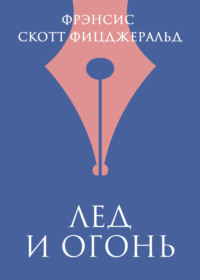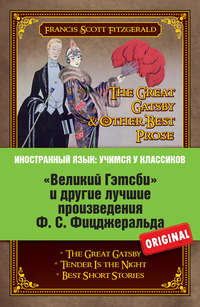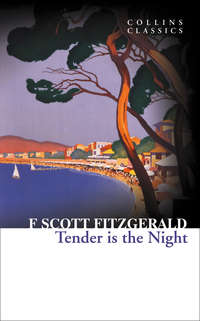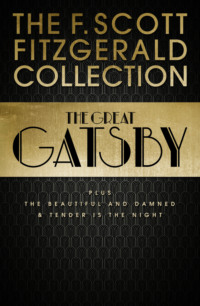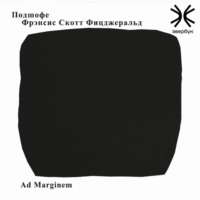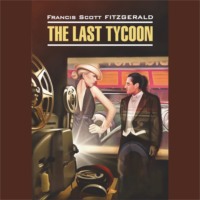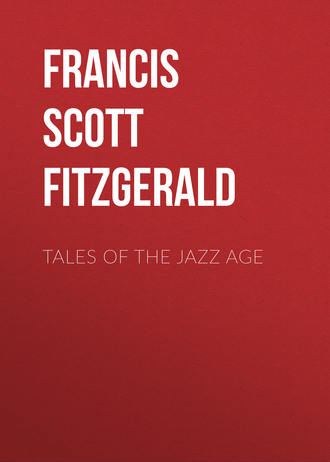 полная версия
полная версияTales of the Jazz Age
As he approached the end his sentences became broken, became short and uncertain, and his body seemed tense, seemed strained to catch the slightest pressure or whisper of life in the spaces around him. His hair had turned gradually white as he talked, and now he lifted his head high to the heavens like a prophet of old – magnificently mad.
Then, as John stared in giddy fascination, it seemed to him that a curious phenomenon took place somewhere around him. It was as though the sky had darkened for an instant, as though there had been a sudden murmur in a gust of wind, a sound of far-away trumpets, a sighing like the rustle of a great silken robe – for a time the whole of nature round about partook of this darkness; the birds' song ceased; the trees were still, and far over the mountain there was a mutter of dull, menacing thunder.
That was all. The wind died along the tall grasses of the valley. The dawn and the day resumed their place in a time, and the risen sun sent hot waves of yellow mist that made its path bright before it. The leaves laughed in the sun, and their laughter shook until each bough was like a girl's school in fairyland. God had refused to accept the bribe.
For another moment John, watched the triumph of the day. Then, turning, he saw a flutter of brown down by the lake, then another flutter, then another, like the dance of golden angels alighting from the clouds. The aeroplanes had come to earth.
John slid off the boulder and ran down the side of the mountain to the clump of trees, where the two girls were awake and waiting for him. Kismine sprang to her feet, the jewels in her pockets jingling, a question on her parted lips, but instinct told John that there was no time for words. They must get off the mountain without losing a moment. He seized a hand of each, and in silence they threaded the tree-trunks, washed with light now and with the rising mist. Behind them from the valley came no sound at all, except the complaint of the peacocks far away and the pleasant of morning.
When they had gone about half a mile, they avoided the park land and entered a narrow path that led over the next rise of ground. At the highest point of this they paused and turned around. Their eyes rested upon the mountainside they had just left – oppressed by some dark sense of tragic impendency.
Clear against the sky a broken, white-haired man was slowly descending the steep slope, followed by two gigantic and emotionless negroes, who carried a burden between them which still flashed and glittered in the sun. Half-way down two other figures joined them – John could see that they were Mrs. Washington and her son, upon whose arm she leaned. The aviators had clambered from their machines to the sweeping lawn in front of the chateau, and with rifles in hand were starting up the diamond mountain in skirmishing formation.
But the little group of five which had formed farther up and was engrossing all the watchers' attention had stopped upon a ledge of rock. The negroes stooped and pulled up what appeared to be a trap-door in the side of the mountain. Into this they all disappeared, the white-haired man first, then his wife and son, finally the two negroes, the glittering tips of whose jewelled head-dresses caught the sun for a moment before the trap-door descended and engulfed them all.
Kismine clutched John's arm.
"Oh," she cried wildly, "where are they going? What are they going to do?"
"It must be some underground way of escape – " A little scream from the two girls interrupted his sentence.
"Don't you see?" sobbed Kismine hysterically. "The mountain is wired!"
Even as she spoke John put up his hands to shield his sight. Before their eyes the whole surface of the mountain had changed suddenly to a dazzling burning yellow, which showed up through the jacket of turf as light shows through a human hand. For a moment the intolerable glow continued, and then like an extinguished filament it disappeared, revealing a black waste from which blue smoke arose slowly, carrying off with it what remained of vegetation and of human flesh. Of the aviators there was left neither blood nor bone – they were consumed as completely as the five souls who had gone inside.
Simultaneously, and with an immense concussion, the château literally threw itself into the air, bursting into flaming fragments as it rose, and then tumbling back upon itself in a smoking pile that lay projecting half into the water of the lake. There was no fire – what smoke there was drifted off mingling with the sunshine, and for a few minutes longer a powdery dust of marble drifted from the great featureless pile that had once been the house of jewels. There was no more sound and the three people were alone in the valley.
XI
At sunset John and his two companions reached the huge cliff which had marked the boundaries of the Washington's dominion, and looking back found the valley tranquil and lovely in the dusk. They sat down to finish the food which Jasmine had brought with her in a basket.
"There!" she said, as she spread the table-cloth and put the sandwiches in a neat pile upon it. "Don't they look tempting? I always think that food tastes better outdoors."
"With that remark," remarked Kismine, "Jasmine enters the middle class."
"Now," said John eagerly, "turn out your pocket and let's see what jewels you brought along. If you made a good selection we three ought to live comfortably all the rest of our lives."
Obediently Kismine put her hand in her pocket and tossed two handfuls of glittering stones before him. "Not so bad," cried John enthusiastically. "They aren't very big, but-Hallo!" His expression changed as he held one of them up to the declining sun. "Why, these aren't diamonds! There's something the matter!
"By golly!" exclaimed Kismine, with a startled look. "What an idiot I am!"
"Why, these are rhinestones!" cried John.
"I know." She broke into a laugh. "I opened the wrong drawer. They belonged on the dress of a girl who visited Jasmine. I got her to give them to me in exchange for diamonds. I'd never seen anything but precious stones before."
"And this is what you brought?"
"I'm afraid so." She fingered the brilliants wistfully. "I think I like these better. I'm a little tired of diamonds."
"Very well," said John gloomily. "We'll have to live in Hades. And you will grow old telling incredulous women that you got the wrong drawer. Unfortunately, your father's bank-books were consumed with him."
"Well, what's the matter with Hades?"
"If I come home with a wife at my age my father is just as liable as not to cut me off with a hot coal, as they say down there."
Jasmine spoke up.
"I love washing," she said quietly. "I have always washed my own handkerchiefs. I'll take in laundry and support you both."
"Do they have washwomen in Hades?" asked Kismine innocently.
"Of course," answered John. "It's just like anywhere else."
"I thought – perhaps it was too hot to wear any clothes."
John laughed.
"Just try it!" he suggested. "They'll run you out before you're half started."
"Will father be there?" she asked.
John turned to her in astonishment.
"Your father is dead," he replied sombrely. "Why should he go to Hades? You have it confused with another place that was abolished long ago."
After supper they folded up the table-cloth and spread their blankets for the night.
"What a dream it was," Kismine sighed, gazing up at the stars. "How strange it seems to be here with one dress and a penniless fiancée!
"Under the stars," she repeated. "I never noticed the stars before. I always thought of them as great big diamonds that belonged to some one. Now they frighten me. They make me feel that it was all a dream, all my youth."
"It was a dream," said John quietly. "Everybody's youth is a dream, a form of chemical madness."
"How pleasant then to be insane!"
"So I'm told," said John gloomily. "I don't know any longer. At any rate, let us love for a while, for a year or so, you and me. That's a form of divine drunkenness that we can all try. There are only diamonds in the whole world, diamonds and perhaps the shabby gift of disillusion. Well, I have that last and I will make the usual nothing of it." He shivered. "Turn up your coat collar, little girl, the night's full of chill and you'll get pneumonia. His was a great sin who first invented consciousness. Let us lose it for a few hours."
So wrapping himself in his blanket he fell off to sleep.
THE CURIOUS CASE OF BENJAMIN BUTTON
I
As long ago as 1860 it was the proper thing to be born at home. At present, so I am told, the high gods of medicine have decreed that the first cries of the young shall be uttered upon the anaesthetic air of a hospital, preferably a fashionable one. So young Mr. and Mrs. Roger Button were fifty years ahead of style when they decided, one day in the summer of 1860, that their first baby should be born in a hospital. Whether this anachronism had any bearing upon the astonishing history I am about to set down will never be known.
I shall tell you what occurred, and let you judge for yourself.
The Roger Buttons held an enviable position, both social and financial, in ante-bellum Baltimore. They were related to the This Family and the That Family, which, as every Southerner knew, entitled them to membership in that enormous peerage which largely populated the Confederacy. This was their first experience with the charming old custom of having babies – Mr. Button was naturally nervous. He hoped it would be a boy so that he could be sent to Yale College in Connecticut, at which institution Mr. Button himself had been known for four years by the somewhat obvious nickname of "Cuff."
On the September morning consecrated to the enormous event he arose nervously at six o'clock dressed himself, adjusted an impeccable stock, and hurried forth through the streets of Baltimore to the hospital, to determine whether the darkness of the night had borne in new life upon its bosom.
When he was approximately a hundred yards from the Maryland Private Hospital for Ladies and Gentlemen he saw Doctor Keene, the family physician, descending the front steps, rubbing his hands together with a washing movement – as all doctors are required to do by the unwritten ethics of their profession.
Mr. Roger Button, the president of Roger Button & Co., Wholesale Hardware, began to run toward Doctor Keene with much less dignity than was expected from a Southern gentleman of that picturesque period.
"Doctor Keene!" he called. "Oh, Doctor Keene!"
The doctor heard him, faced around, and stood waiting, a curious expression settling on his harsh, medicinal face as Mr. Button drew near.
"What happened?" demanded Mr. Button, as he came up in a gasping rush.
"What was it? How is she? A boy? Who is it? What – "
"Talk sense!" said Doctor Keene sharply, He appeared somewhat irritated.
"Is the child born?" begged Mr. Button.
Doctor Keene frowned. "Why, yes, I suppose so – after a fashion." Again he threw a curious glance at Mr. Button.
"Is my wife all right?"
"Yes."
"Is it a boy or a girl?"
"Here now!" cried Doctor Keene in a perfect passion of irritation, "I'll ask you to go and see for yourself. Outrageous!" He snapped the last word out in almost one syllable, then he turned away muttering:
"Do you imagine a case like this will help my professional reputation?
One more would ruin me – ruin anybody."
"What's the matter?" demanded Mr. Button appalled. "Triplets?"
"No, not triplets!" answered the doctor cuttingly. "What's more, you can go and see for yourself. And get another doctor. I brought you into the world, young man, and I've been physician to your family for forty years, but I'm through with you! I don't want to see you or any of your relatives ever again! Good-bye!"
Then he turned sharply, and without another word climbed into his phaeton, which was waiting at the curbstone, and drove severely away.
Mr. Button stood there upon the sidewalk, stupefied and trembling from head to foot. What horrible mishap had occurred? He had suddenly lost all desire to go into the Maryland Private Hospital for Ladies and Gentlemen – it was with the greatest difficulty that, a moment later, he forced himself to mount the steps and enter the front door.
A nurse was sitting behind a desk in the opaque gloom of the hall.
Swallowing his shame, Mr. Button approached her.
"Good-morning," she remarked, looking up at him pleasantly.
"Good-morning. I – I am Mr. Button."
At this a look of utter terror spread itself over girl's face. She rose to her feet and seemed about to fly from the hall, restraining herself only with the most apparent difficulty.
"I want to see my child," said Mr. Button.
The nurse gave a little scream. "Oh – of course!" she cried hysterically. "Upstairs. Right upstairs. Go —up!"
She pointed the direction, and Mr. Button, bathed in cool perspiration, turned falteringly, and began to mount to the second floor. In the upper hall he addressed another nurse who approached him, basin in hand. "I'm Mr. Button," he managed to articulate. "I want to see my – "
Clank! The basin clattered to the floor and rolled in the direction of the stairs. Clank! Clank! It began a methodical descent as if sharing in the general terror which this gentleman provoked.
"I want to see my child!" Mr. Button almost shrieked. He was on the verge of collapse.
Clank! The basin reached the first floor. The nurse regained control of herself, and threw Mr. Button a look of hearty contempt.
"All right, Mr. Button," she agreed in a hushed voice. "Very well! But if you knew what a state it's put us all in this morning! It's perfectly outrageous! The hospital will never have a ghost of a reputation after – "
"Hurry!" he cried hoarsely. "I can't stand this!"
"Come this way, then, Mr. Button."
He dragged himself after her. At the end of a long hall they reached a room from which proceeded a variety of howls – indeed, a room which, in later parlance, would have been known as the "crying-room." They entered.
"Well," gasped Mr. Button, "which is mine?"
"There!" said the nurse.
Mr. Button's eyes followed her pointing finger, and this is what he saw. Wrapped in a voluminous white blanket, and partly crammed into one of the cribs, there sat an old man apparently about seventy years of age. His sparse hair was almost white, and from his chin dripped a long smoke-coloured beard, which waved absurdly back and forth, fanned by the breeze coming in at the window. He looked up at Mr. Button with dim, faded eyes in which lurked a puzzled question.
"Am I mad?" thundered Mr. Button, his terror resolving into rage. "Is this some ghastly hospital joke?
"It doesn't seem like a joke to us," replied the nurse severely. "And I don't know whether you're mad or not – but that is most certainly your child."
The cool perspiration redoubled on Mr. Button's forehead. He closed his eyes, and then, opening them, looked again. There was no mistake – he was gazing at a man of threescore and ten – a baby of threescore and ten, a baby whose feet hung over the sides of the crib in which it was reposing.
The old man looked placidly from one to the other for a moment, and then suddenly spoke in a cracked and ancient voice. "Are you my father?" he demanded.
Mr. Button and the nurse started violently.
"Because if you are," went on the old man querulously, "I wish you'd get me out of this place – or, at least, get them to put a comfortable rocker in here."
"Where in God's name did you come from? Who are you?" burst out Mr.
Button frantically.
"I can't tell you exactly who I am," replied the querulous whine, "because I've only been born a few hours – but my last name is certainly Button."
"You lie! You're an impostor!"
The old man turned wearily to the nurse. "Nice way to welcome a new-born child," he complained in a weak voice. "Tell him he's wrong, why don't you?"
"You're wrong. Mr. Button," said the nurse severely. "This is your child, and you'll have to make the best of it. We're going to ask you to take him home with you as soon as possible-some time to-day."
"Home?" repeated Mr. Button incredulously.
"Yes, we can't have him here. We really can't, you know?"
"I'm right glad of it," whined the old man. "This is a fine place to keep a youngster of quiet tastes. With all this yelling and howling, I haven't been able to get a wink of sleep. I asked for something to eat" – here his voice rose to a shrill note of protest – "and they brought me a bottle of milk!"
Mr. Button, sank down upon a chair near his son and concealed his face in his hands. "My heavens!" he murmured, in an ecstasy of horror. "What will people say? What must I do?"
"You'll have to take him home," insisted the nurse – "immediately!"
A grotesque picture formed itself with dreadful clarity before the eyes of the tortured man – a picture of himself walking through the crowded streets of the city with this appalling apparition stalking by his side.
"I can't. I can't," he moaned.
People would stop to speak to him, and what was he going to say? He would have to introduce this – this septuagenarian: "This is my son, born early this morning." And then the old man would gather his blanket around him and they would plod on, past the bustling stores, the slave market – for a dark instant Mr. Button wished passionately that his son was black – past the luxurious houses of the residential district, past the home for the aged…
"Come! Pull yourself together," commanded the nurse.
"See here," the old man announced suddenly, "if you think I'm going to walk home in this blanket, you're entirely mistaken."
"Babies always have blankets."
With a malicious crackle the old man held up a small white swaddling garment. "Look!" he quavered. "This is what they had ready for me."
"Babies always wear those," said the nurse primly.
"Well," said the old man, "this baby's not going to wear anything in about two minutes. This blanket itches. They might at least have given me a sheet."
"Keep it on! Keep it on!" said Mr. Button hurriedly. He turned to the nurse. "What'll I do?"
"Go down town and buy your son some clothes."
Mr. Button's son's voice followed him down into the hall: "And a cane, father. I want to have a cane."
Mr. Button banged the outer door savagely…
II
"Good-morning," Mr. Button said nervously, to the clerk in the Chesapeake Dry Goods Company. "I want to buy some clothes for my child."
"How old is your child, sir?"
"About six hours," answered Mr. Button, without due consideration.
"Babies' supply department in the rear."
"Why, I don't think – I'm not sure that's what I want. It's – he's an unusually large-size child. Exceptionally – ah large."
"They have the largest child's sizes."
"Where is the boys' department?" inquired Mr. Button, shifting his ground desperately. He felt that the clerk must surely scent his shameful secret.
"Right here."
"Well – " He hesitated. The notion of dressing his son in men's clothes was repugnant to him. If, say, he could only find a very large boy's suit, he might cut off that long and awful beard, dye the white hair brown, and thus manage to conceal the worst, and to retain something of his own self-respect – not to mention his position in Baltimore society.
But a frantic inspection of the boys' department revealed no suits to fit the new-born Button. He blamed the store, of course – in such cases it is the thing to blame the store.
"How old did you say that boy of yours was?" demanded the clerk curiously.
"He's – sixteen."
"Oh, I beg your pardon. I thought you said six hours. You'll find the youths' department in the next aisle."
Mr. Button turned miserably away. Then he stopped, brightened, and pointed his finger toward a dressed dummy in the window display. "There!" he exclaimed. "I'll take that suit, out there on the dummy."
The clerk stared. "Why," he protested, "that's not a child's suit. At least it is, but it's for fancy dress. You could wear it yourself!"
"Wrap it up," insisted his customer nervously. "That's what I want."
The astonished clerk obeyed.
Back at the hospital Mr. Button entered the nursery and almost threw the package at his son. "Here's your clothes," he snapped out.
The old man untied the package and viewed the contents with a quizzical eye.
"They look sort of funny to me," he complained, "I don't want to be made a monkey of – "
"You've made a monkey of me!" retorted Mr. Button fiercely. "Never you mind how funny you look. Put them on – or I'll – or I'll spank you." He swallowed uneasily at the penultimate word, feeling nevertheless that it was the proper thing to say.
"All right, father" – this with a grotesque simulation of filial respect – "you've lived longer; you know best. Just as you say."
As before, the sound of the word "father" caused Mr. Button to start violently.
"And hurry."
"I'm hurrying, father."
When his son was dressed Mr. Button regarded him with depression. The costume consisted of dotted socks, pink pants, and a belted blouse with a wide white collar. Over the latter waved the long whitish beard, drooping almost to the waist. The effect was not good.
"Wait!"
Mr. Button seized a hospital shears and with three quick snaps amputated a large section of the beard. But even with this improvement the ensemble fell far short of perfection. The remaining brush of scraggly hair, the watery eyes, the ancient teeth, seemed oddly out of tone with the gaiety of the costume. Mr. Button, however, was obdurate – he held out his hand. "Come along!" he said sternly.
His son took the hand trustingly. "What are you going to call me, dad?" he quavered as they walked from the nursery – "just 'baby' for a while? till you think of a better name?"
Mr. Button grunted. "I don't know," he answered harshly. "I think we'll call you Methuselah."
III
Even after the new addition to the Button family had had his hair cut short and then dyed to a sparse unnatural black, had had his face shaved so close that it glistened, and had been attired in small-boy clothes made to order by a flabbergasted tailor, it was impossible for Button to ignore the fact that his son was a poor excuse for a first family baby. Despite his aged stoop, Benjamin Button – for it was by this name they called him instead of by the appropriate but invidious Methuselah – was five feet eight inches tall. His clothes did not conceal this, nor did the clipping and dyeing of his eyebrows disguise the fact that the eyes under – were faded and watery and tired. In fact, the baby-nurse who had been engaged in advance left the house after one look, in a state of considerable indignation.
But Mr. Button persisted in his unwavering purpose. Benjamin was a baby, and a baby he should remain. At first he declared that if Benjamin didn't like warm milk he could go without food altogether, but he was finally prevailed upon to allow his son bread and butter, and even oatmeal by way of a compromise. One day he brought home a rattle and, giving it to Benjamin, insisted in no uncertain terms that he should "play with it," whereupon the old man took it with – a weary expression and could be heard jingling it obediently at intervals throughout the day.
There can be no doubt, though, that the rattle bored him, and that he found other and more soothing amusements when he was left alone. For instance, Mr. Button discovered one day that during the preceding week he had smoked more cigars than ever before – a phenomenon, which was explained a few days later when, entering the nursery unexpectedly, he found the room full of faint blue haze and Benjamin, with a guilty expression on his face, trying to conceal the butt of a dark Havana. This, of course, called for a severe spanking, but Mr. Button found that he could not bring himself to administer it. He merely warned his son that he would "stunt his growth."
Nevertheless he persisted in his attitude. He brought home lead soldiers, he brought toy trains, he brought large pleasant animals made of cotton, and, to perfect the illusion which he was creating – for himself at least – he passionately demanded of the clerk in the toy-store whether "the paint would come oft the pink duck if the baby put it in his mouth." But, despite all his father's efforts, Benjamin refused to be interested. He would steal down the back stairs and return to the nursery with a volume of the Encyclopedia Britannica, over which he would pore through an afternoon, while his cotton cows and his Noah's ark were left neglected on the floor. Against such a stubbornness Mr. Button's efforts were of little avail.



